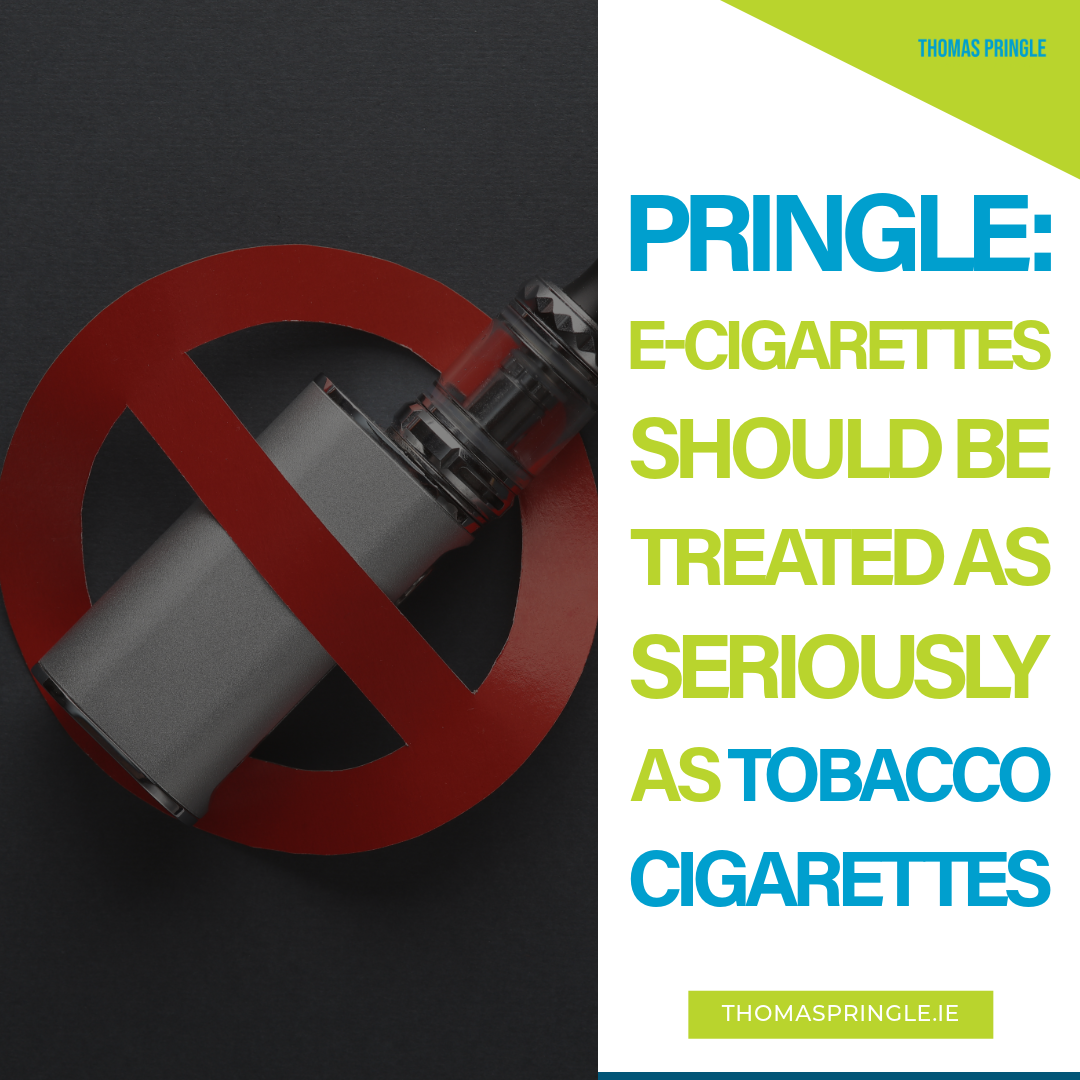- Pringle: We need a policy that recognises the importance of inshore fishing
- Pringle: Disabled people and carers face crisis of State neglect
- Pringle: Failed FF/FG housing policies forcing people to put their lives on hold
- Pringle welcomes Donegal council motion on Occupied Territories Bill: ‘We cannot stand by in the face of genocide’
Pringle: E-cigarettes should be treated as seriously as tobacco cigarettes
- Updated: 5th July 2024

Independent TD for Donegal, Thomas Pringle, said he supported raising the minimum age of sale of tobacco products to 21, and said he believed e-cigarettes should be treated as seriously as tobacco cigarettes.
Addressing the Dáil on Thursday, Deputy Pringle said: “Tobacco use is the leading cause of preventable death in Ireland and almost 6,000 smokers die each year from tobacco-related illnesses. Studies have shown that every week, 1,000 people are hospitalised and over 100 people die in Ireland from smoking-related diseases.
“As well as this, the Regulatory Impact Analysis of this bill cites estimated figures for the annual financial impact of smoking of €10.6 billion every year; €506 million of this includes hospital-based costs, primary care costs and domiciliary care costs,” he said.
The deputy said: “Research has shown that experimentation with tobacco use before the age of 18 has been a strong predictor of daily use in adults. This is why it is important that we do all we can to reduce smoking amongst young people,” he said.
The deputy was speaking in support of Public Health (Tobacco) (Amendment) Bill 2024 and its intention to raise the minimum legal age of sale of tobacco products to 21.
He said: “Although raising the legal age to purchase tobacco products to 21 might not have a huge impact on those aged 18 to 20 accessing tobacco, I believe it will have a significant impact on 15- to 17-year-olds who are accessing tobacco, as they are less likely to be in social circles of those aged 21 and older.
“Research and history has shown this. A US modelling study suggests that a policy of raising the age of sale to 21 has the potential to reduce smoking rates by 25% among 15- to 17-year-olds, and by 15% among 18- to 20-year-olds.
“In Ireland, when we raised the age of the sale of tobacco from 16 to 18 in 2007, analysis found that it reduced smoking prevalence and the likelihood of ever having tried a cigarette among 14- and 15-year-olds.
“This legislation can only be seen as a positive step. However, I believe that it is also a missed opportunity to address the rise in vaping among young people. Research shows that 8% of the population currently use e-cigarettes and this percentage is much higher for young people,” noting that 16% of men aged 15 to 24, and 20%, or a fifth, of women aged 15 to 24 use e-cigarettes.
The deputy said: “This is a trend we are seeing, not just in Ireland or Europe, but globally, and so it requires a global response, or at the very least, a more focused research into this trend and its effects.”
He said: “The Growing Up in Ireland study showed that the rate of 13-year-olds who tried cigarettes or tobacco fell from 9% to just 3% in 10 years, which is very positive, you would imagine. However nearly 10% of 13-year-olds had tried vaping.
“Emerging research indicates that prolonged use of vapes may lead to an increased risk of heart and lung conditions. The World Health Organisation states that these products are harmful to health and they state that it is too early to provide a clear answer to their long-term health impact.
“Nicotine is highly addictive and some evidence suggests that minors who never smoked before and use e-cigarettes can double their chances of starting to smoke cigarettes later in life. Because of this, I believe that e-cigarettes should be treated as seriously as tobacco cigarettes,” he said.
The deputy said he had also supported the Public Health (Tobacco Products and Nicotine Inhaling Products) Bill 2023 and welcomed restrictions on the sale of e-cigarettes, including banning sales from mobile premises and vending machines.
Deputy Pringle said: “However, I would like to know what the government is doing to ensure that these restrictions are being fully and properly implemented. As we know, it is festival season and many of our young people will attend concerts and festivals over the next couple of months.
“It seems, however, that mobile premises selling e-cigarettes are still a feature of very many of these venues, despite the fact that the law came into effect in December. It calls into question the effectiveness of introducing legislation if the restrictions legislated for are not being enforced.”
Deputy Pringle said: “I urge the Minister to consider and put the necessary steps in place to ensure that legislation is being implemented on the ground because that’s what will have the positive effect.”



